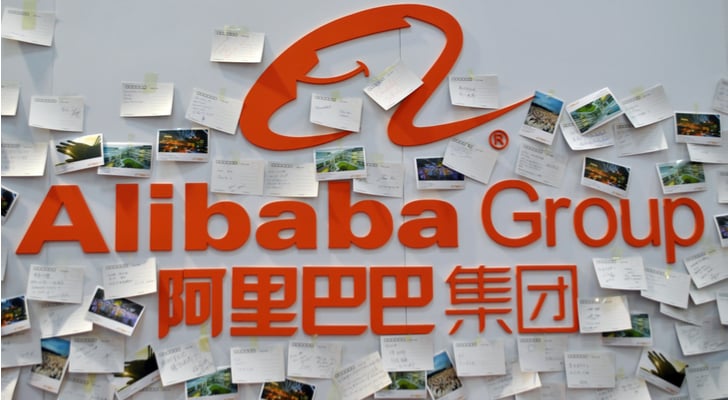Alibaba (NYSE:BABA) has dominated headlines this week. On Monday, founder and executive chairman Jack Ma announced that he would step down in 2019 to “focus on philanthropy and education.” Then on Tuesday, the company announced that it is forming a joint venture with Russia’s sovereign wealth fund (RDIF), telecom firm MegaFon and internet company Mail.Ru. All of these events have put BABA stock investors on edge, as these two bombshells are the latest in a string of news that reflect changes within the storied Chinese e-commerce giant.
But what does this all mean for the future of Alibaba stock? Let’s take a closer look.
BABA: Global Expansion Is Very Much a Priority
Alibaba already serves about 80% of the Chinese e-commerce market, and the company has taken numerous steps to expand its foothold overseas. BABA has charged into Southeast Asia, investing $1 billion for a 51% stake in Lazada in 2016. Alibaba then doubled down on the investment the following year, which brought its stake to 83%, and installed its own CEO, BABA co-founder Lucy Peng.
Alibaba has also either acquired or made a stake in Singapore-based Redmart, Singapore Post and Indonesia-based Tokopedia, all of which are online marketplaces. Moreover, BABA and its subsidiary Ant Financial have been very busy in the online payment sector, building stakes in Singapore’s M-Daq, Thai firms TrueMoney and Ascend Nano, Philippines-based Mynt and Malaysia’s Touch n’ Go.
The new focus on Southeast Asia makes sense for Alibaba, and it hold great promise for BABA stock. The 10 nations that make up the Association of Southeast Asian Nations boast a population of 640 million people. With millions of new users coming online every month, the region represents a massive business opportunity.
Tuesday’s news highlights a new piece of the global expansion puzzle for Alibaba stock. AliExpress, which is the firm’s global marketplace, opened service in Russia a few years ago. But Tuesday’s deal will give it exposure to Mail.Ru’s 100 million registered users, to which it provides social media, email and food delivery services. MegaFon and RDIF will also play a key role in maximizing BABA’s exposure in Russia. All of these factors add to the bullish case for BABA stock.
The joint venture is valued at a cool $2 billion, according to TechCrunch. And this figure does not even include other investments into the venture, meaning that it could be even more lucrative. Alibaba has also made moves in India and Europe, where it is expanding its cloud-based services and building brand recognition. Plus, Alipay is slowly gaining presence in the U.K., Greece and other nations in the region, although that process will still take time.
What Does This All Mean for BABA Stock?
By now, Alibaba stock investors have realized that BABA has quite a few pieces in play. But with Ma stepping down and growing domestic and international competition, there are still notable concerns for the tech conglomerate, and by extension BABA stock. A majority of the firm’s exposure is in China, which is in the midst of an economic slowdown and a trade war with the U.S.
Fellow giant Tencent (OTCMKTS:TCEHY) is in the middle of an ongoing battle both in China and Southeast Asia. Moreover, Alibaba’s expansion to the West has also put it in the crosshairs of Amazon (NASDAQ:AMZN), eBay (NASDAQ:EBAY) and Paypal (NASDAQ:PYPL), to name a few.
But these risks are inevitable for any growing business. Alibaba’s continued streak of solid earnings beats, coupled with strong strategic acquisitions and investments, leaves the firm well-positioned for long-term growth.
Still, analysts for BABA stock have concerns in the short-term, as reflected by nearly universal negative earnings estimate revisions for the current quarter, next quarter, current fiscal year and next fiscal year. BABA’s performance, while strong, has underperformed its industry in the last year (-9.8% vs. 35.4% in the e-commerce market).
Regardless, Alibaba’s latest move into Russia is a maneuver that U.S. firms cannot even consider due to various tensions. This strategic advantage is one that Alibaba could continue to build on, giving it a competitive moat against industry peers. While the firm may still have turbulence ahead, it is very much worth keeping on the radar for years to come.
Wall Street’s Next Amazon
Zacks EVP Kevin Matras believes this familiar stock has only just begun its climb to become one of the greatest investments of all time. It’s a once-in-a-generation opportunity to invest in pure genius.
Want the latest recommendations from Zacks Investment Research? Today, you can download 7 Best Stocks for the Next 30 Days. Click to get this free report
Amazon.com, Inc. (AMZN): Free Stock Analysis Report
Alibaba Group Holding Limited (BABA): Free Stock Analysis Report
eBay Inc. (EBAY): Free Stock Analysis Report
Tencent Holding Ltd. (TCEHY): Free Stock Analysis Report
PayPal Holdings, Inc. (PYPL): Free Stock Analysis Report

